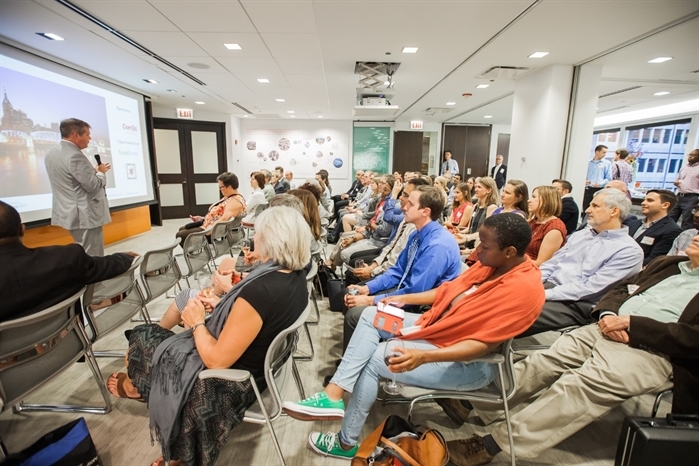
Gretchen Villaluna Baria, Moonhouse Productions
Former Nashville Mayor Karl Dean
Nashville grows by 80 people per day, while Chicago lost 6,263 residents in 2015. What is driving people to flock to the Music City instead of the Windy City? Last Wednesday, Sept. 21, more than 75 curious people joined former Nashville Mayor Karl Dean at MPC’s Urban Think & Drink to find out.
During Karl Dean’s two terms in office as Mayor, 2007 to 2015, Nashville received national recognition as a “Boomtown,” “It City” and one of “The Best Cities for Jobs.” Throughout Dean’s talk, a guiding ethos emerged: "A city must have enough confidence in itself to invest in itself."
When he first took office, Dean had a keen sense of Nashville’s assets. He thought tourism was unnaturally low, given everything Nashville had to offer. Even amidst the last economic recession, his administration invested boldly in tourism, business recruitment and a top-notch convention center.
Dean focused on attracting businesses in “sectors that have a future.” For example, Nashville is now seen as the Silicon Valley of healthcare technology. Dean noted that local economies thrive when “no one sector dominates the city,” and in Nashville there is a strong balance of low- and high-skilled employment in diverse industries.
In addition to laying down a welcome mat for new businesses, many in the Nashville community have warmly welcomed new immigrants; to Dean, “there is no bigger compliment than when new immigrants decide to fight for their dreams in your city.”
During his first term in office, there was significant backlash against immigration, culminating in a proposed “English Only” amendment to establish English as the required language for business in Nashville. In response, Dean said, a robust, grassroots coalition of civic, neighborhood, business and labor groups defeated the amendment and “the city hasn’t looked back since.” Between 2000 and 2012, foreign-born immigrants accounted for 60 percent of Nashville’s population growth, and now represent 12.5 percent of the population.
Dean emphasized that “investing in your city’s future” means truly prioritizing school funding and school improvements. “Nashville has a long way to go," but Dean said he won’t rest until more families see the city's schools as a strength. In his mind, “Cities with the highest high school and college graduation rates will attract the most people.”
Beyond targeted investments, Dean said that decades of good governance has been key to Nashville’s boom. Starting in 1963, Nashville was the “first true city-county consolidation in the country,” paving the way for financial and service delivery efficiencies, lower taxes and fewer bureaucratic hurdles. By encompassing urban, suburban and rural land, the Nashville region retained a healthy tax base for public investments even as people moved away from the downtown core in recent decades.
While Chicago doesn’t grapple with all of the same challenges, there are lessons to be learned here. Attractive job opportunities elsewhere, the health of our school system or our tangled web of 7,000+ units of government could be some factors driving residents away. Dean’s stories spoke to the need for initiatives like Transform Illinois to support local government efficiency. Join us for lunch next Wednesday, Oct. 5, as we honor people transforming local and state government in innovative ways!
Our evening with Karl Dean shed light on lessons from Nashville to reverse Chicagoland’s population loss. But just like when you tour an out-of-town friend around Chicago, the event also reminded us of Chicago’s strengths—from our racial and ethnic diversity to our robust transit network to the potential of our three rivers. As Dean advised, we must be “confident” enough in our assets to invest in them…and, in turn, give people the confidence to call Chicagoland home.

MPC thanks ComEd, Yagan Family Fund and TransitCenter for their generous sponsorship of our Growing Cities series, and Revolution Brewing for providing libations. Join us at a future event!